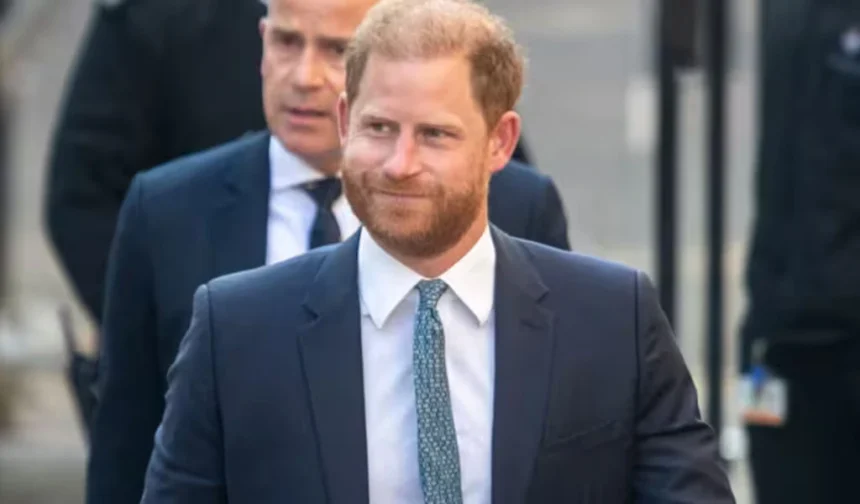(CTN News) – The Duke of Sussex claims that Prince Harry was “singled out for disparate, unwarranted, and inferior treatment” during his appearance before the London High Court in connection with ongoing legal proceedings concerning his security arrangements in the United Kingdom.
Prince Harry claims that he withdrawn his high court action against the Home Office because the Executive Committee for the Protection of Royalty and Public Figures (Ravec) decided to downgrade his security while in the country.
The 40-year-old Duke positioned himself behind his legal counsel in a crowded courtroom, while his barrister, Shaheed Fatima KC, informed the appellate court that Sir Peter Lane had made an error in his previous year’s verdict.
The court determined that Ravec’s judgment, made in early 2020 after Prince Harry and Meghan resigned from their positions as senior working royals, was neither irrational nor procedurally unjust.
Fatima informed the court that Ravec had broken its own duty by employing a “bespoke and distinctive process” rather than seeking a review from a “specialised expert body,” the risk management board (RMB).
The appellant argued that “bespoke” did not mean “superior.” “His submission constitutes evidence of having endured inferior, unwarranted, and inequitable treatment.”
Harry must go through the same evaluation process as any other individual considered for protective security by Ravec, unless there is a compelling reason to break from this norm, as his situation does not naturally provide the same level of protection as before.
This is from Fatima’s perspective.
Her written comments show that Duke has not acquired an RMB analysis, despite current security issues. Certain elements of the entries were censored for security reasons.
For example, his security team was informed that “Al-Qaeda recently called for [Harry] to be assassinated” in a document, adding that his “murder would satisfy the Muslim community.” She also highlighted an incident in May 2023 in which Prince Harry and Meghan were pursued by paparazzi in New York City.
She argued that the appeal was based on the judge’s wrong determination that there was a “good reason” to depart from Ravec’s terms of reference, and that Ravec had the right to determine that the duke was not a member of the “other VIP” group without contacting the RMB. The court further erred by concluding that Prince Harry was not in a comparable position to others in the category.
The fundamental issue raised by this appeal is whether Ravec has demonstrated a “clear, logical, and convincing rationale” for refraining from undertaking an RMB assessment, she claims.
Sir James Eadie KC, representing the Home Office, which is legally responsible for Ravec, stated, “Harry’s appeal demonstrates a continual failure to comprehend the broader context, offering arguments based solely on selective fragments of the evidence and the judgment, while ignoring the full scope of the situation.”
The previously provided personal security will not be completely abolished; nevertheless, it will no longer be available under the same terms due to his new status as a non-working royal residing overseas.
In written comments,
Eadie said that Prince Harry’s bespoke decision-making process assessed the adequacy and justification of protective measures for each visit he planned to Great Britain, eliminating the need for a Risk Management Board (RMB) meeting.
The earlier judge may concur that the duke would be “better accommodated by that method” and that “bespoke was more suitable.”
He quoted Sir Richard Mottram, the former head of Ravec, who stated that an RMB appraisal would be “challenging to produce effectively.” Mottram’s sense of danger was enhanced after getting improved threat assessments for the Duke. Ravec’s expert judgment was consistently considered authoritative in this technique, and the judge correctly decided that it was legal.
Eadie claims that Prince Harry’s “gravamen,” or essence, was his “mere disagreement” with the earlier finding and the Ravec verdict, which “does not provide grounds for an appeal.” A decision is expected at a later date following the two-day appellate court hearing presided over by Sir Geoffrey Vos, Lord Justice Bean, and Lord Justice Edis.
In February 2020, Ravec concluded that the duke and his family will get a unique level of taxpayer-funded security during their stay in the United States following their move.
In 2023, the Supreme Court denied Prince Harry’s appeal to fund his own defense after he filed a case the previous year. The duke’s legal representatives indicated that Harry “does not feel secure” under the new security standards.
Due to security concerns, certain evidence will be disclosed in private at the case’s Wednesday hearings.
SOURCE: TG
SEE ALSO:
The Supreme Court Allows Trump to Fire Thousands of Federal Workers.
U.S. Steel Hits 52-Week High as Trump Requests Nippon Steel Bid Security Review.

Salman Ahmad is known for his significant contributions to esteemed publications like the Times of India and the Express Tribune. Salman has carved a niche as a freelance journalist, combining thorough research with engaging reporting.














